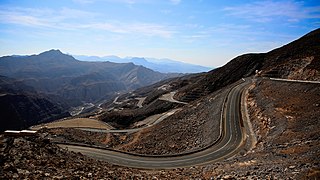This article covers the various forms of transport in the United Arab Emirates (UAE), by road, rail, air, water, etc.

The United Arab Emirates, or simply the Emirates, is a country in West Asia and the Middle East. It is located at the eastern end of the Arabian Peninsula and shares borders with Oman and Saudi Arabia, while also having maritime borders in the Persian Gulf with Qatar and Iran. Abu Dhabi is the country's capital, while Dubai, the most populous city, is an international hub.

Hinduism has been found in the Middle East since the early 16th century. Millions of members of the Indian diaspora, of different religions, reside and work in Arab states of the Persian Gulf; many of them are Hindu. Many came due to the migration of Indians and Nepalese expatriates and employees to the area around the Persian Gulf.
According to human rights organisations, the government of the UAE violates a number of fundamental human rights. The UAE does not have democratically elected institutions and citizens do not have the right to change their government or to form political parties. Activists and academics who criticize the regime are detained and imprisoned, and their families are often harassed by the state security apparatus. There are reports of forced disappearances in the UAE; many foreign nationals and Emirati citizens have been abducted by the UAE government and illegally detained and tortured in undisclosed locations. In numerous instances, the UAE government has tortured people in custody , and has denied their citizens the right to a speedy trial and access to counsel during official investigations.

The Catholic Church in the United Arab Emirates is part of the worldwide Catholic Church, under the spiritual leadership of the Pope in Rome.

The Emiratis are the native citizen population of the United Arab Emirates. Within the UAE itself, they number approximately 1.15 million.
Mass media in the United Arab Emirates is subject to government control and censorship. Media freedom is severely curtailed in the UAE. Most UAE media is owned by the government or by groups that have ties to the government. UAE law permits the government to censor content critical of the government. Journalists and writers who criticize the government are subject to repression.
Indians in the United Arab Emirates constitute the largest part of the population of the country. Over 3,860,000 Indian expats are estimated to be living in the UAE, which is over 38 percent of the total population of the UAE and the fourth highest number of overseas Indian people in the world, after the United States, Saudi Arabia and Nepal. Indian contact with the emirates that now constitute the UAE dates back several centuries, as a result of trade and commerce between the emirates and India. The UAE has experienced a tremendous increase in the population of resident Indians who initially migrated to the country as a result of opportunities in petroleum. Now, Indians are key to the UAE's construction, retail, financial services, healthcare, manufacturing and transport sectors. A sizeable minority of Indian migrants are involved in professional services and entrepreneurship. Relations between India and the UAE have traditionally been very friendly.

According to the 2005 census, Christians accounted for 9 percent of the total population of the United Arab Emirates; estimates in 2010 suggested a figure of 12.6%.
Armenians in United Arab Emirates refers to ethnic Armenians living in the United Arab Emirates. They number around 5,000.
Americans in the United Arab Emirates are residents of the United Arab Emirates (UAE) who originate from the United States. As of 2015, there are over 50,000 Americans living in the country.
Iraqis in the United Arab Emirates have a population exceeding 200,000, closer estimates report a total of 250,000 Iraqis in the Emirates. Since its independence, Iraqis have contributed in the development of UAE, as engineers, politicians and in other fields. Most notably Adnan Pachachi who was appointed as Minister of State in the first Government of the Emirate of Abu Dhabi. Pachachi is known for his role in submitting the UAE's application for membership in the United Nations. In a meeting with Prime Minister of Iraq, Mustafa Al-Kadhimi, Mohamed bin Zayed Al Nahyan stated that "Iraqis have contributed in building the UAE, and there are many of them who worked, built, developed and helped build the Emirates, and we mention this credit to them, whether engineers, doctors, or even politicians and others. There are still many Iraqis living in the UAE, and they are credited.”
Islam is both the official and majority religion in the United Arab Emirates, professed by approximately 76% of the population.The Al Nahyan and Al Maktoum ruling families adhere to Sunni Islam of Maliki school of jurisprudence. Many followers Hanbali school of Sunni Islam are found in Sharjah, Umm al-Quwain, Ras al-Khaimah and Ajman. Their followers include the Al Qasimi ruling family. Other religions represented in the country including Christianity, Hinduism, Buddhism, Zoroastrians, Druze, Baha'i Judaism and Sikhism are practiced by non-nationals.
Expatriates in the United Arab Emirates represent about 90% of the population, while Emiratis constitute roughly 12% of the total population, making the UAE home to one of the world's highest percentage of expatriates.
Television in the United Arab Emirates began in 1969.
Al Wathba is a suburb of Abu Dhabi in the United Arab Emirates that has a wetland nearby. It is located not too far from the international airport.

Tourism in the United Arab Emirates is an important component of the Emirati economy, and consists of domestic and international components. In 2018, tourist industry composed over 164.7 billion dirham to country's GDP.





